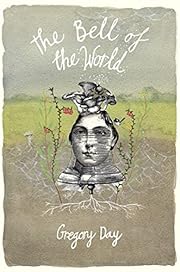

Click on a thumbnail to go to Google Books.
|
Loading... The Bell of the Worldby Gregory Day
None No current Talk conversations about this book. no reviews | add a review
Awards
When a troubled Sarah Hutchinson returns to Australia from boarding school in England and time spent in Europe, she is sent to live with her eccentric Uncle Ferny on the family property, Ngangahook. With the sound of the ocean surrounding everything they do on the farm, Sarah and her uncle form an inspired bond hosting visiting field naturalists and holding soirees in which Sarah performs on a piano whose sound she has altered with items and objects from the bush and shore. As Sarah's world is nourished by music and poetry, Ferny's life is marked by Such is Life, a book he has read and reread, so much so that the volume is falling apart. Its saviour is Jones the Bookbinder of Moolap, who performs a miraculous act. To shock and surprise, Jones interleaves Ferny's volume with a book he bought from an American sailor, a once obscure tale of whales and the sea. In art as in life nature seems supreme. Ngangahook and its environs are threatened, however, when members of the community ask the Hutchinsons to help 'make a savage landscape sacred' by financing the installation of a town bell. The fearless musician and her idealistic uncle refuse to buckle to local pressures, mounting their own defence of 'the bell of the world'. Gregory Day's new novel embodies a cultural reckoning in a breathtakingly beautiful and lyrical way. The Bell of the World is both a song to the natural wonders that are not yet gone and a luminous prehistory of contemporary climate change and its connection to colonialism. It is a book immersed in the early to mid-twentieth century but written very much for the hearts of the future. No library descriptions found. |
Current DiscussionsNone
 Google Books — Loading... Google Books — Loading...GenresMelvil Decimal System (DDC)823.92Literature English & Old English literatures English fiction 1900- 2000-LC ClassificationRatingAverage: (4.5) (4.5)
Is this you?Become a LibraryThing Author. |
||||||||||||||||||||||||||||||||||||||||||||||||||||||||||||||||||||||||||||||||||||||||||||||||||||||||||||||||||||||||
The Bell of the World is a challenging book, not because it's hard to read and make sense of, but because it challenges our ideas about what art is, what music is, and even what literature is.
Titled 'Big Cutting Hill' and set in the early years of the 20th century, Part One introduces Sarah Hutchinson, a troubled young woman under the care of an Indigenous woman called Maisie. Sarah's immediate family is absent from the novel, so we know only that her mother drank to excess and that after her parents' acrimonious divorce Sarah was packed off to boarding school in Devon. There, bells punctuate her day and she feels claustrophobic after the wide open spaces of Australia. From there she is offloaded to Uncle Ferny's bohemian circle in Rome.
In Rome, in artistic circles (that include 'poetivores'!) Sarah is exposed to (and excited by) modernism. But sent home to Uncle Ferny's farm Ngangahook she is confused, lethargic and depressed, and it is Maisie's wisdom that begins to heal her. This healing coincides with the return of Uncle Ferny (who is hairy from reading i.e. unshaven!)
In Part Two, (in Sarah's voice) Ngangahook illustrates the clash between European settler values and the Hutchinsons' desire to belong in their landscape. The local wannabe dignitary Selwyn Atchison wants a civic bell to dignify the town (and himself), expressing...
Sarah and Uncle Ferny reject the entire concept. Such a bell would impose itself on the bush which has its own ancient soundscape of birds and the rustlings of native fauna and the whistling of the wind in the trees.
(The point is that nations do irreversible things without any consideration for how it might impact globally... climate change, nuclear waste, starting endless wars, noise pollution from planes, blighting the night sky with satellites, invading privacy with drones. None of us can escape from it, and on and on and on it goes with global forums powerless to put a stop to it.)
Uncle Ferny's refusal to contribute to the fund to pay for this intrusive bell arouses not only indignation but ostracism in the town. The townsfolk were already bemused by Sarah's concerts on her 'altered piano'. In her narrative she includes a newspaper clipping:
What is music? Sarah's composition is titled 'My Autumn' and it distinguishes the Australian autumn from the European one with its very sound. We learn later in Part Three that Sarah — alone on an isolated property — is creating experimental music that could take its place amongst the most radical of experimentalists in the 20th century.
To read the rest of my review please visit https://anzlitlovers.com/2023/03/06/the-bell-of-the-world-2023-by-gregory-day/ (